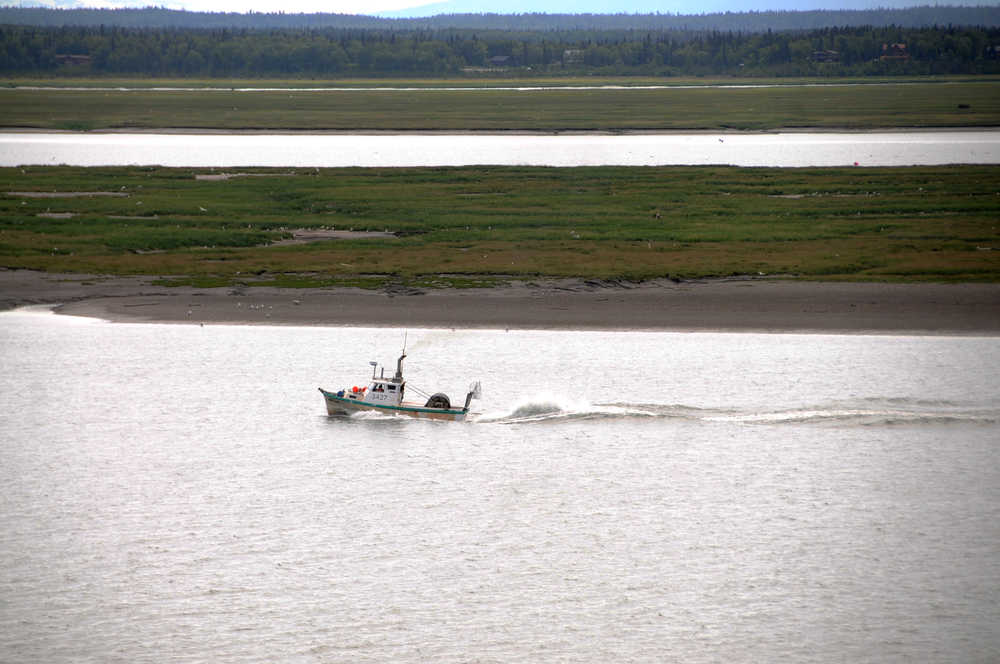The Cook Inlet fish wars just became a federal problem. Again.
A three-judge panel of the U.S. Ninth Circuit Court of Appeals sided with commercial fishing groups against a 2011 decision by the North Pacific Fishery Management Council to remove several Alaska salmon fisheries from the federal fishery management plan, or FMP.
The United Cook Inlet Drift Association, an industry group, filed the lawsuit in 2013 to repeal the council’s decision, which was officially Amendment 12 to the Alaska salmon FMP. The initial suit was rejected by U.S. Alaska District Court Judge Timothy Burgess. The 9th Circuit remanded the case back to Burgess with instructions to find for the plaintiffs.
Federal fisheries policymakers and state managers will now have to work together on a suitable FMP, which the National Oceanic and Atmospheric Administration had hoped to rid itself of in 2011 by passing Amendment 12 in the first place.
In a release, UCIDA said the lawsuit bodes well for the health of Alaska’s fishermen and the resource.
“With the use of standards described in the MSA, such as conservation, sustainability, prevention of over fishing, and by utilizing the best scientific information available, the salmon resources of Cook Inlet will be sustainable and bountiful for all Alaskans who rely on Cook Inlet salmon for recreation, healthy food, and jobs, for generations to come,” the statement reads.
In December 2011 the North Pacific council, one of eight councils that oversee fisheries in federal waters from three to 200 miles offshore, gave the Alaska Department of Fish and Game management authority of Cook Inlet, Prince William Sound and Alaska Peninsula salmon fisheries, removing the historic fisheries from the federal oversight. Only Southeast Alaska remained under direct federal oversight due to the Pacific Salmon Treaty with Canada.
The court notes that giving the State of Alaska management authority isn’t a problem, but clarifies that the state should manage to the requirements of a federal plan, not its own.
“The panel held that the National Marine Fisheries Service cannot exempt a fishery under its authority that required conservation and management from and FMP because the agency is content with state management,” the decision reads. “The (Magnuson-Stevens Act) requires a regional fishery management council to create an FMP for each fishery under its authority that requires conservation and management.”
The biggest change from the council’s decision concerned a switch in salmon management focus away from the Magnuson-Stevens Act, which established the regional fishery councils in 1976.
Federal FMPs must subscribe to the National Standards of the federal Magnuson-Stevens Act, the 10 commandments of the federal fisheries world that require fisheries managers to consider optimum yield, best available science, equitable allocations and community health among other factors.
UCIDA has long held that the state’s escapement goal-based management — which is not held to the National Standards — leads to massive amounts of unharvested salmon and overescapement in Cook Inlet.
Erik Huebsch, UCIDA’s vice president, said it’s unclear whether the decision will apply to all the areas affected by Amendment 12.
“It depends on what the prescribed remedies are,” he said.
The organization does not want Cook Inlet to go into direct federal management, but instead, Huebsch said the members want to see the North Pacific council develop a management plan for the fishery that complies with the Magnuson-Stevens Act and delegate it to the state.
Huebsch highlighted the lack of state action on invasive species — specifically northern pike, which infest a large number of streams and lakes in the Mat-Su Borough and prey on salmonids — and hope that with the new decision will spur Fish and Game to deal with those invasive species.
“A lot of the problems in Cook Inlet are because the state has been managing Cook Inlet differently than other areas of the state,” he said.
Huebsch said some kind of interim plan would have to go into place for fisheries management before next season’s start. The fisheries cannot go on under a management plan ruled illegal, he said.
The fisheries regulators who will make a new plan have no concrete details yet.
Sam Cotten, Fish and Game commissioner and one of 11 voting members of the North Pacific council, said he thinks the decision defies the will of both the state and the federal government, both of which wanted Alaskan management for the region’s salmon. The state and the National Marine Fisheries Service, he said, want to work together.
“We do not need the U.S. government’s help in salmon management,” Cotten said. “We obviously have to get this resolved. The U.S. doesn’t want to manage salmon in those waters.”
Cotten said he and representatives of the National Marine Fisheries Service have already talked to review the state’s strategy, which could include an FMP that delegates management to the state or an appeal to the three-judge panel’s ruling. He fears federal management would be redundant and could potentially backfire.
“I understand the interest on part of the plaintiffs in trying to improve their situation, but I was never convinced that even if they won it would improve their situation,” he said. “What we don’t want to have happen, is a situation could come up where you would have to close those waters, and the very people asking for this decision would be impacted the worst by it.”
The North Pacific council’s future actions are uncertain. Chris Oliver, the executive director of the North Pacific council, said he could not yet comment on the court decision pending further discussions with the National Oceanic and Atmospheric Administration and the U.S. Department of Justice.
Alaska region NMFS administrators Jim Balsiger and Glenn Merrill were not immediately available for comment.
DJ Summers can be reached at daniel.summers@alaskajournal.com. Elizabeth Earl can be reached at elizabeth.earl@peninsulaclarion.com.

